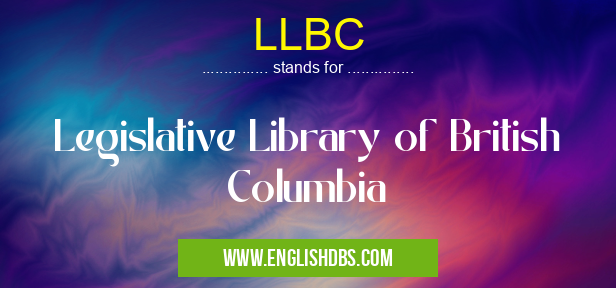What does LLBC mean in LEGISLATION
LLBC stands for Legislative Library of British Columbia. It is the official legislative library of the province of British Columbia, Canada. The library is located in Victoria, the provincial capital, and its mission is to provide information and research support to the Legislative Assembly of British Columbia, its members, and the public.

LLBC meaning in Legislation in Governmental
LLBC mostly used in an acronym Legislation in Category Governmental that means Legislative Library of British Columbia
Shorthand: LLBC,
Full Form: Legislative Library of British Columbia
For more information of "Legislative Library of British Columbia", see the section below.
LLBC Meaning in GOVERNMENTAL
The LLBC is an important part of the provincial government of British Columbia. It provides research and information services to the Legislative Assembly, its members, and other government officials. The library also plays a role in public education and outreach, and it offers a variety of programs and services to the general public.
LLBC Full Form
The full form of LLBC is Legislative Library of British Columbia.
What Does LLBC Stand For?
LLBC stands for Legislative Library of British Columbia.
Conclusion
The LLBC is an important resource for the Legislative Assembly of British Columbia, the provincial government, and the general public. The library provides a wide range of information and research services, and it plays a vital role in the democratic process in British Columbia.
Essential Questions and Answers on Legislative Library of British Columbia in "GOVERNMENTAL»LEGISLATION"
What is the Legislative Library of British Columbia (LLBC)?
The LLBC is a provincially funded research library that supports the work of the Legislative Assembly of British Columbia and the broader parliamentary community. As a non-partisan research and information resource, the LLBC provides access to specialized collections, expert research services, and legislative reference materials.
Who can use the LLBC's services?
The LLBC's services are primarily intended for the Members of the Legislative Assembly (MLAs) and their staff, government officials, and parliamentary researchers. However, the library also welcomes requests from members of the public, students, researchers, and other interested individuals.
What types of resources does the LLBC offer?
The LLBC offers a wide range of resources, including:
- A comprehensive collection of legislative documents, including bills, statutes, and regulations
- Books, journals, and other publications on parliamentary procedure, public policy, and political science
- Access to online databases and research tools
- Expert research assistance from experienced librarians
How can I access the LLBC's resources?
You can access the LLBC's resources in person at the library's location in Victoria, British Columbia, or online through the library's website. For in-person access, you may need to present identification or request a library card. For online access, you can browse the library's catalog or request research assistance through their website.
Are there any fees for using the LLBC's services?
The LLBC's services are generally free of charge for most users. However, there may be fees for certain specialized services, such as document retrieval or extensive research projects.
